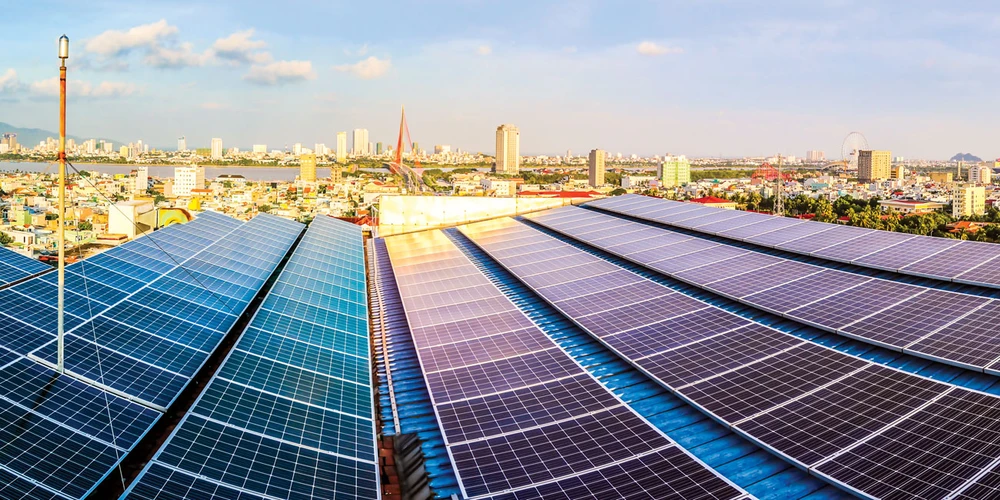
Authorities cautious
Recently, at a meeting with power corporations, representatives from Vietnam Electricity (EVN) affirmed they must create conditions for maximum support to encourage investors in developing rooftop solar power systems (RSPSs). Specifically, in coming time, EVN will focus on removing difficulties and obstacles to promote the development of RSPSs, create favorable conditions for developing RSPSs, bring efficiency for investors in an appropriate and effective manner, and provide a suitable grid capability to release power.
At the same time, professional boards and power corporations must study grid capabilities to release power in areas and bring out technical guidelines and standards for investors to consider appropriate investment scales. EVN will also provide technical guidance and standards to assist investors in selecting suitable technologies. Until the beginning of June 2020, there were more than 31,100 RSPSs across the country, with a total installed capacity of about 640 MWp, electricity generation of more than 145 million kWh, and total cash amount paid to customers by EVN of VND 300 bn.
However, EVN is still cautious about RSPSs for its small scale and capacity to supply mainly households. With the current large-scale solar power projects, there are still many problems, of which an outstanding issue is the infrastructure system serving power transmission. In particular, the agreement on power purchase agreement between the project developer and EVN after many years has not yet been achieved. For instance, in some localities in the south central region, many solar power projects are still stuck and withdrawing from these would mean losing capital, and waiting for completion will take too long.
According to Mr. Nguyen The Thang, Head of the Electrical System Development Department of Vietnam Energy Institute, the above situation shows that there is a serious flaw in development of solar projects. While a solar power project takes only about six months to complete, to implement a transmission grid of 220kV or 500kV takes about three to five years. This has caused transmission infrastructure not keeping up with solar power projects.
In addition, the risks involved in the solar power projects as yet have no solutions. Mr. Thang believes that no country so far has the technology to handle solar panels after expiry date, which is 20 to 25 years. In a project contract, foreign companies sell batteries on the condition that after the expiry date the panels will be moved back to production place. However, during those 25 years there are many risks, such as battery companies going bankrupt, for instance. Hence, Mr. Thang feels that there is no one taking responsibility in such a contract.
Simplify project approval process
In the Vietnam Energy Plan (Version 2.0) by the Vietnam Business Forum (VBF), representatives of foreign business associations in Vietnam recommended that the Government should have a special mechanism to encourage energy experts in the private sector to participate in the development of the PDP VIII, with priority given to the development of renewable energy, gas, storage batteries and efficient use of energy. In addition, there must be implementation of laws and incentives to encourage private investors to develop large and small renewable energy projects, such as RSPSs, storage batteries, farm Solar PV, floating solar PV, offshore and onshore wind power, and biomass power.
The foreign investors also proposed simplifying the project approval process, because when legalities are cleared, a more comprehensive mechanism will attract many investors to participate in this field, sharing the burden of public investment with the State. According to foreign investors, they can overcome many problems when they decide to invest in this field, such as problems of investment capital, construction of power transmission systems, and technologies for developing renewable energy projects.
Speaking with Saigon Investment on this issue, Mr. Bjorn Salvid, Commercial Counselor at the Embassy of Sweden in Vietnam, said that Swedish investors are very interested in the field of renewable energy in Vietnam and are waiting to see a complete functional system. Mr. Bjorn Salvid feels that as Vietnam is now becoming more focused on renewable energy development, Swedish investors see this as an opportunity and companies in Sweden such as ABB, Ericson have the strength to invest in this field.
However, transmission lines have to be upgraded, especially connection between stations. Mr. Bjorn Salvid also believes that as private companies have recently been involved in the construction of power lines, this could open the way for the private sector later. He reiterated that Swedish businesses are very interested in this field but want to know Vietnamese government policies such as incentives for foreign businesses, involvement procedures for private enterprises, future of power purchase contracts, and tax incentives, if any.
However, Mr. Bjorn Salvid also feels that though Vietnam has been focusing a lot on developing solar power, other types of renewable energy such as wind power and electricity from waste treatment also need equal attention.




















